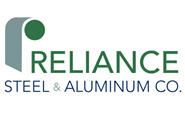Market Segment

February 18, 2021
Dismal Aerospace, Energy Markets Weigh on Reliance Earnings
Written by Sandy Williams
“Extraordinary challenges on a global scale” is how Reliance Steel & Aluminum CEO Jim Hoffman characterized 2020 during the service center’s conference call this week. However, Hoffman was optimistic about the new year, “As I continue to say, America is going to need Reliance in order to rebuild.”
In the fourth quarter, Reliance sales fell 12.8% year-over-year with half of the decline blamed on dismal conditions in the commercial aerospace and energy markets. Commercial aerospace appeared to bottom out in the fourth quarter, and Reliance expects to see a slow gradual recovery in 2021. The other side of aerospace–defense, military and space—continue to be very strong and positive. “Energy is what it is, but there are little signs of relief recently,’ said Hoffman.
New Vice President and CFO Arthur Ajemyan noted that “while macroeconomic uncertainty from COVID persists, improving demand and increases on stainless and carbon products allows us to maintain higher gross margins.” Tons sold are expected to increase 10% to 12% in the first quarter compared to Q4 2020 and selling prices to increase 12% to 14%.
Solid demand and rising input costs led to higher metal pricing and, in turn, increased pricing for Reliance products in Q4. As steel pricing accelerated in the fourth quarter, prices for certain carbon products almost doubled, leading to the average selling price increasing 4.6% from Q3.
Reliance’s net sales for the quarter totaled $2.13 billion, up 2.3% from Q3 and down 12.8% from Q4 2019. Net income was $129.8 million, a 32.8% increase from the previous quarter but a decrease of 21.7% from the fourth quarter of 2019.
On the automotive side of the business, the microchip shortage is having minimal impact on Reliance, said Bill Sales, executive vice president, operations. Sales added that the company is storing more material than before and thinks the auto industry will be in catch-up mode going forward.
Demand for semiconductors steadily improved from the third quarter and is now one of Reliance’s strongest markets. The semiconductor outlook appears strong for the first half of 2021 with some forecasts predicting double-digit growth for the sector for multiple years, said Sales.
No M&A activity is expected in the near term, although Reliance has looked into a number of potential acquisitions. Hoffmann said the company is expanding its outlook into adjacent businesses that are not traditional service centers. “I am encouraged that something will pop up this year that will interest us,” he added.
Gross profit margins were at record levels of 33.0% for the fourth quarter and 31.5% for full-year 2020. A key factor behind the record full-year growth was the company’s value-added processing capabilities, said President Karla Lewis. Orders for value added products declined to 49% from 51% due to changes in product mix resulting from the pandemic, but processing continued to serve as a stabilizer to margins in challenging markets, she said.
In the Reliance end markets, auto toll processing was back to pre-COVID levels and the company commenced operations in a new facility in Kentucky in November. Additionally, the company broke ground on a new greenfield tolling facility in Texas; both facilities will focus on carbon tolling.
Agriculture and construction equipment also rebounded from second quarter, the executives said.
Nonresidential construction, the company’s largest market, remained steady in the fourth quarter, said Lewis. Quoting is active for infrastructure projects, schools, utilities, water and power, strip malls, and data and distribution centers. Reliance is cautiously optimistic about business conditions in the first quarter based on healthy backlogs, quoting activity and positive customer sentiment.
“In the past year, Reliance adapted to operate more efficiently than ever without sacrificing the competitive edge that makes Reliance a trusted and reliable partner,” said Hoffman.







